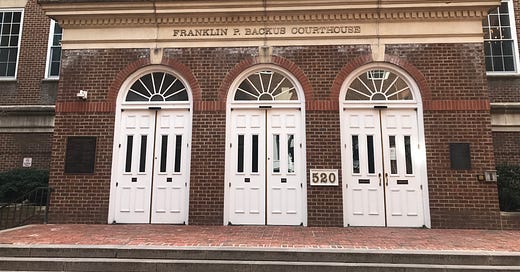The Alexandria Circuit Court is an important place for anyone interested in the future of the Zoning for Housing (ZFH) amendments to the city’s zoning code adopted in December 2023 and also in whether Jefferson-Houston will change from its current K-8 grade configuration.
The following is an attempt to distill the issues in the ZFH case (Coalition for a Livable Alexandria, et al. v. City of Alexandria, et al., Civil Action No. CL24-1039) and the Jefferson-Houston case (O’Brien v. Alexandria City Public Schools School Board, Civil Action No. CL25-0000126). The latter is a request for judicial review of the School Board’s decision to make Jefferson-Houston a middle school.
No prediction is made about the final outcomes, and no commentary is offered on the evidence or on the merits of the claims and defenses in these cases.
The ZFH Case
Retired Fairfax County Circuit Judge David S. Schell, who ruled for the objecting homeowners in Arlington County’s Missing Middle zoning case in September 2024, has scheduled the ZFH case for a five-day nonjury trial starting July 28, but this may change. On February 14, a letter from the Circuit Court advised the parties that Schell has fully retired as a “recall” judge—meaning he won’t be part of any cases he had been working on—and that the Virginia Supreme Court had been asked to designate a new judge.
Schell had previously dismissed the Coalition for a Livable Alexandria as a plaintiff in the ZFH case for lack of standing, or an insufficient showing of directly incurred harm. The remaining plaintiffs are Alexandria homeowners.
Count I of the Amended Complaint alleges that in adopting ZFH the City Council and the Planning Commission acted ultra vires, or beyond the authority granted by statute and the City Charter. Thus, the plaintiffs assert, ZFH was void ab initio, meaning null and void from the beginning.
Count I alleges, “City Council and the Planning Commission failed to consider the Comprehensive Plan, which includes the Stormwater Master Plan, the Master Transportation Plan, the Sanitary Sewer System Master Plan, Recycling Program Implementation Plan, Public Spaces Master Plan, the Community Energy Plan, and the Water Distribution Master Plan, among others” and that, “Without adequate studies or investigations, the Comprehensive Plan could not be updated, and the Plan’s elements could not address what is otherwise a drastic increase in density in low density areas.”
Count II alleges that the study performed by the Council and the Planning Commission, “addressed the feasibility of different housing types within low-density neighborhood lot requirements and what would entice developers, but then concluded without the benefit of any other studies that the Zoning Amendments would minimally affect surrounding properties” and infrastructure, “despite drastically increasing population density in formerly low-density neighborhoods.”
Thus, ZFH’s adoption is alleged to be, “arbitrary and capricious and not reasonably related to the public health, safety, morals, and general welfare and thus is void ab initio.”
Count III alleges that the Council and Planning Commission did not comply with the Virginia Code’s provisions for advertising public hearings because they, “did not advertise the November 14 and 18, 2023 public hearings as to the public hearings regarding Ordinances 5514 and 5515 for two successive weeks, and the notice that was advertised appeared more than 14 days before.” Count III also alleges written notice should have been sent by first class mail.
The case may turn on what the Council and Planning Commission considered in adopting ZFH. Last year, the defendants filed a Motion Craving Oyer asking that the Court require that a document sued upon, or a collateral document necessary to the plaintiffs’ claims, be treated as though it were part of the plaintiffs’ pleadings. The parties agreed that the Motion Craving Oyer could be deferred and refiled at the close of discovery. The practical effect is that the factual record before the court may be extensive.
The Jefferson-Houston Case
On January 21, a Jefferson-Houston parent, representing himself, sought judicial review of the School Board’s decision to make Jefferson-Houston a middle school.
The plaintiff alleges that the Board’s decision is flawed because of defective public notice: “The Board did not provide ‘reasonable notice to the public in a newspaper of general circulation in the school division’ at least seven days prior to the Board meeting on 19 December 2024, nor did the Board ever hold a public hearing to receive public comment on any motion.”
The plaintiff alleges, “The Board waited until all opportunities for the community to voice concern about the Board’s improperly noticed proposal to ‘make a plan’ to eliminate elementary education from Jefferson-Houston before amending that plan into the directive subject,” meaning the Board did not adopt a plan, it took final official action. A short description of this claim might be “bait-and-switch.”
Finally, the plaintiff alleges that the Board abused its discretion because it did not properly study or consider the impacts of its decision. On February 26, the Board’s counsel filed a Demurrer asserting various defenses.
The common through lines in the ZFH and Jefferson-Houston cases are not new: the factual record on which local government bodies base their decisions, and the required public notice provisions that precede those decisions, are extremely important.
The writer is a former lawyer, member of the Alexandria School Board from 1997 to 2006, and English teacher from 2007 to 2021 at T.C. Williams High School, now Alexandria City High School. He can be reached at aboutalexandria@gmail.com and free subscriptions to his newsletter are available at https://aboutalexandria.substack.com.
.
Thanks for reading About Alexandria!
Subscribe for free to receive new posts.





Excellent review and explanation.